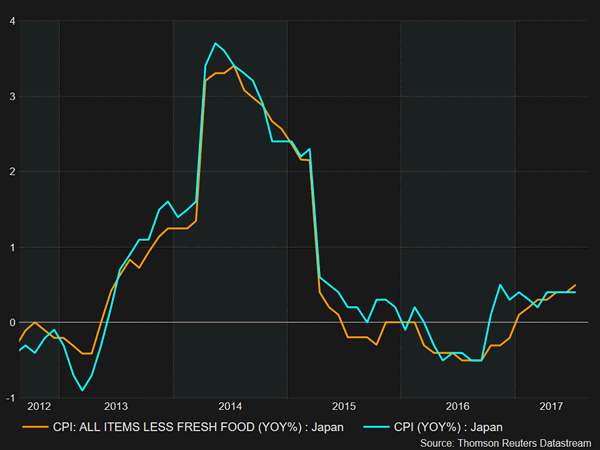According to the Ministry of International Affairs and Communications, Japanese core inflation continued rising steadily for the seventh consecutive month in July. However, the measure remained weak, as anticipated, far away from the Bank of Japan’s (BOJ) 2% target, reducing chances for a rate hike anytime soon. Consequently, the yen retreated slightly against its US counterpart during the Asian trading hours.
As analysts projected, for the month of July, headline consumer prices in Japan picked up by 0.4% y/y for the fourth consecutive month.
Excluding fresh food items, the core CPI index improved in line with forecasts by 0.1 percentage points to 0.5% y/y, recording the highest growth since April 2015 and gaining for the seventh straight month. Though it remained below 2015 levels when the index was above the 2% target before the massive earthquake of a magnitude of 8.5 (Richter scale) hits the country. Barring energy products as well, the index posted its first growth in five months, increasing by 0.1% y/y.
Food prices were up by 0.6% y/y (-0.3% m/m, seasonally adjusted), while fuel, light and water charges increased the most, jumping by 4.3% y/y (0% m/m, seasonally adjusted).

In Tokyo, the flash CPI index for the month of August, experienced the highest increase since 2016, hinting that nationwide inflation to be released next month might elevate. The index rose surprisingly by 0.4 percentage points to 0.5% y/y, exceeding the forecast of 0.3%. Core CPI came in better than expected as well at 0.4% y/y. This was above the forecast of 0.3% and July’s mark of 0.2%.
While the Japanese economy picked up speed in the second quarter, with GDP growing substantially from 0.4% to 1.0% and household and business spending showing signs of improvement, companies still felt hesitant to raise prices. They were also reluctant to increase wages as they believe that the recent economic pickup might be temporary. Hence, taking all this into account, the decision of the BOJ in July to downgrade its inflation forecasts for the next two years is justified together with the projections that the BOJ will likely stick to its current ultra-easy policy during its next meeting on September 20. Note that the BOJ expects inflation to touch its 2% target in the fiscal year to March 2020 as it anticipates that gradual developments in the labor market will boost prices.
Looking at the reaction in the forex markets, the yen fell immediately by 0.20% relative to the dollar, with dollar/yen climbing from 109.51 prior the data release to a session high of 109.71. However, the pair edged down afterwards, last trading at 109.64.
